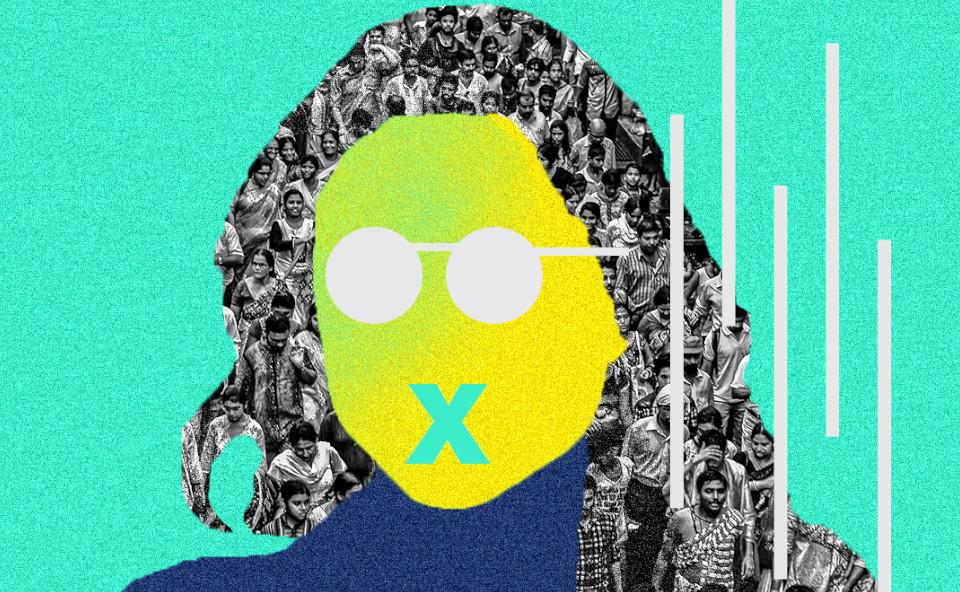
"W". Illustration by Saurabh Tikekar. Creative Commons BY-NC-ND
Governments around the world are increasingly turning to technology as a tool to combat the spread of the COVID-19 pandemic. In India, these tools have ranged from various contact tracing apps to using drones. Privacy concerns have been raised about the use of such intrusive digital technologies by activists, lawyers and concerned citizens. But while these are valid, a crucial element remains unrecognised: what is at stake is not merely our informational privacy, but our autonomy, dignity, bodily integrity, and equality.
We live in a world where data about us is constantly being collected. Governments and corporations are moving towards using data as a means of governance and regulation of what our physical bodies can do. This is what is happening for example, when you are asked to digitally scan your fingerprint to allow your physical body to enter your workspace. Or you may have felt a sense of unease when you realise you are under surveillance through CCTV cameras. Nobody is physically present, yet we somehow feel the gaze on our bodies. Through our data, our bodies are routinely subjected to gaze and control.
Scholar Irma Van der Ploeg has written about this “informatisation of our body” and the consequences of the “translation of many aspects of our bodies into digital data, codes and information.” She has rightly pointed out that these developments undermine the neat line between our bodies and our data, and require us to rethink the way we look at our bodies in the digital age: informational privacy may no longer be sufficient to ensure our rights are protected. Instead we need to include matters such as bodily integrity, autonomy and dignity.
In the current jump towards technologies as a means to combat the pandemic and our bodies, this is particularly evident. Consider, for example, the questions of control that are raised as this line is becoming blurred.
Most people would feel puzzled or even uncomfortable inviting an official into their home every hour to show they are complying with quarantine orders. But effectively, that is what is happening through apps such as Karnataka’s Quarantine Watch, which requires those under quarantine to send hourly selfies with GPS coordinates to officials. Through your digital images, your physical body is being disciplined to stay at home, without the need for the official to be physically present.
Similarly, geo-fencing (where a virtual border using location data is created) has been used to ensure that home quarantined do not violate quarantine rules. For example: Punjab’s COVA app uses geo-fencing to track movements. Again, your body stays in your home through a datafied border of sorts. A physical threshold is no longer needed to exert control.
And where personal data about ourselves is shared or leaked, this may lead to us experiencing a sense of lack of control, fear of uncertainty, and loss, even though nothing has been taken from us physically.
This is evident, for example, where data of those who have been home quarantined is shared publicly. Those affected have reported immense psychological stress. In Hyderabad, one home-quarantined man described his experience as ‘torture’ after people started calling at odd hours to provide suggestions or ask questions. In Karnataka, google-maps based on location data shared publicly by officials led to harassment, after neighbours shared personal information on Whatsapp and Facebook using these lists. In response, one individual said, “We need to fight the virus but without harassing and stigmatizing people.”
Thus, the potential misuse of our data raises concerns beyond just privacy. It can lead to individuals feeling humiliated, publicly targeted and shamed, raising concerns of dignity and non-discrimination.
The consequences of the public sharing of personal data will not be felt equally by everyone. The experiences we have navigating the material world are often relational to who we are and what body we have. Those who do not conform to society’s dominant views, such as trans people , tend to face greater stigma and discrimination.In Hyderabad, derogatory posters targeting trans people were put up saying interaction with them could lead to infection with the coronavirus. Such differences also apply to the virtual world shaping our online experiences. Given the greater risk of stigma trans people face, public sharing of their personal data can have dangerous consequences
So while a pandemic might warrant greater collection of our data, we must not lose sight of the harms this can bring, now and in the future. The data now collected by various institutions can be used to re-exert control over our bodies, through ways often unknown, making it hard to question this. But data protection legislations have not kept up with this new reality and the challenges it brings. Formulated on the premise of data as a ‘resource’ or ‘oil’, they tend to completely miss out on the issues of bodily integrity and autonomy.
The ability of the State to exert control over our bodies through data is becoming increasingly evident through this pandemic. Our bodies are truly being dis-eased through a virus unknown, and we need to acknowledge it for us to be able to effectively tackle it.
This piece has been authored by Tanisha Ranjit and edited by Anja Kovacs. It is part of the ongoing research on bodies and data at the Internet Democracy Project.
Note: A shorter version of this article was originally published in the Hindu.
Publication date
Year of publication
- 3009 views





Add new comment